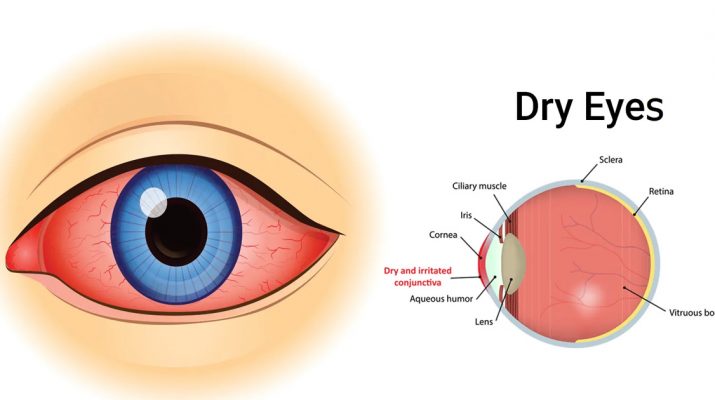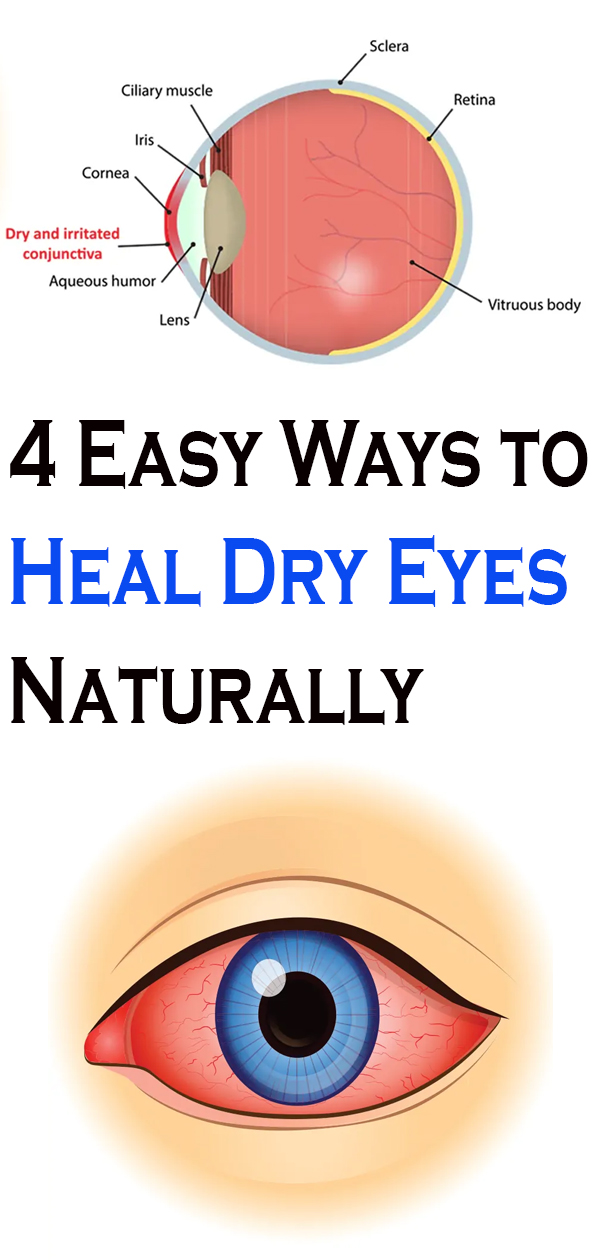Dry Eyes
Dry eyes is a very common condition, occurring when there is not an adequate supply of tears from the lacrimal gland, which sits between the eyeball and eyelid. These glands produce the fluid necessary to lubricate the eyes.
Certain settings can produce dry eyes, such as an airplane flight, an air-conditioned space, riding a bike, walking, or running. Staring at a digital screen for an extended period of time can also cause dry eyes.
Symptoms of dry eyes include:
- blurred vision
- dry, scratchy, and painful sensation in one or both eyes
- eye fatigue
- feeling like something is in your eye
- sensitivity to light
- mucus in or around the eyes
- redness
According to Healthline, common factors that contribute to dry eyes include aging, prescription medications, medical conditions, and the environment.
Traditionally, eye drops are used to moisten dry eyes and are considered “very safe” according to WebMD. Additionally, eye drops may delay the onset of glaucoma and even help correct a lazy eye.
Some people really can’t stand the idea of putting anything in their eyes. Other people may have various reasons they can’t use eye drops. Don’t fret if eye drops aren’t an option.
Here Are Four Natural Ways To Get Rid Of Dry Eyes:
1. Omega-3 Supplements
Research shows that augmenting your diet with omega-3 fatty acids can help alleviate (and possibly prevent) dry eyes. A study, published in the International Journal of Ophthalmology, involved 264 patients with dry eyes, who were randomly chosen to receive one 500-milligram capsule of omega-3s twice daily, or a placebo.
A surprising 65 percent of participants in the omega-3 group – compared to 33 percent of patients in the placebo group – reported a “significant improvement” in symptoms after three months. “Omega-3 fatty acids have a definite role for dry eye syndrome,” the researchers concludes.
If you choose not to take omega-3s in capsules, you can also get those fatty acids naturally. Excellent food sources of omega-3s include anchovies, chia seeds, flaxseed, salmon, and sardines.
2. Modify The Environment
As mentioned, environmental factors can play a role in developing dry eyes. In fact, the link between specific environments and dry eyes is so strong that experts sometimes refer to the resulting condition as Environmental Dry Eye Disease or EDED. EDED is directly caused by “pollutants and/or adverse climatic conditions.”
Protect your eyes by wearing the appropriate eye-wear when biking, motorcycling, skiing, and while working in dusty and dirty environments. Also, try to avoid any areas where people are smoking, and stay inside during windy conditions. A good pair of sunglasses can also help, especially if you suffer from eye sensitivity due to dry eyes.
3. Give Your Eyes A Break
You can logically infer that the leading cause of dry eyes is continued work in specific settings. You should take frequent breaks from any task that requires extended periods of visual concentration, such as reading, writing, using a smartphone or laptop, and so forth.
Close your eyes for a few minutes or blink to spread tears evenly over your eyes. Try to never go for more than 20 minutes gazing at a screen. If your work requires this, every 20 minutes, close your eyes for a full 20 seconds in order to give your eyes a rest. For a quick fix, you can also keep eye drops handy.
4. Look Inside Your Medicine Cabinet
Certain OTCs, or over-the-counter medicines, may cause dry eyes. Among these OTCs are antihistamines, birth-control pills, and nasal decongestants. These common medicines may disrupt the functioning of the Meibomian glands, which produce an oil that prevents tears from evaporating too quickly.
Some prescription medications are known to cause dry eyes, as well. These include antidepressants, beta-blockers (blood control pills), tranquilizers, and medications for Parkinson’s disease.
(Note: Never stop taking a prescription medication without approval from your primary care physician. Medical oversight is necessary to limit certain withdrawal symptoms.)
Prevention Tips
Experiencing dry eyes is usually a short-term, non-serious, and avoidable issue. With this in mind, make sure to pay attention to conditions that may cause a case of dry eyes. Here are a few tips to help you out:
- Use a humidifier, which can add some moisture to dry indoor air.
- When using a hair dryer, heater, fan, or other device that expels air, re-direct the airflow away from your face.
- Position your computer slightly below eye level. A computer screen set above eye level will cause you to reflexively widen your eyes, which expedites the evaporation of tears.
- Don’t smoke, as it is directly linked to dry-eye conditions. As mentioned, stay away from areas where smoke – nicotine or otherwise – is prevalent.


